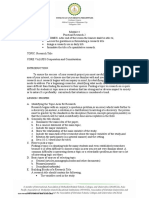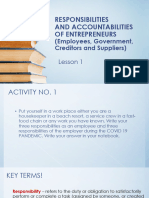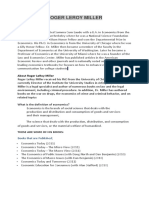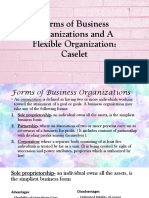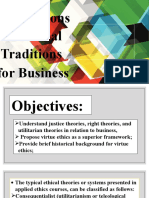Entrep Mind Module 5
Entrep Mind Module 5
Uploaded by
Wynnie RondonCopyright:
Available Formats
Entrep Mind Module 5
Entrep Mind Module 5
Uploaded by
Wynnie RondonCopyright
Available Formats
Share this document
Did you find this document useful?
Is this content inappropriate?
Copyright:
Available Formats
Entrep Mind Module 5
Entrep Mind Module 5
Uploaded by
Wynnie RondonCopyright:
Available Formats
ILOCOS SUR
POLYTECHNIC STATE
SantaCOLLEGE
Maria Campus
MODULE
MODULE IN
Elective 104
THE ENTREPRENEURIAL MIND
Module 5
ALBERT G. NAUNGAYAN
Assistant Professor I
Course Code: ELECTIVE 104
Descriptive Title: THE ENTREPRENEURIAL MIND
Instructor: ALBERT G. NAUNGAYAN
ILOCOS SUR
POLYTECHNIC STATE
SantaCOLLEGE
Maria Campus
MODULE
MODULE 5
ENTREPRENEURIAL PERSONALITY
Entrepreneurship is not for everyone. But how do we know, beforehand, that a person is a
good prospect. What determines success or failure? It is important for those interested in
entrepreneurship to know the answers to those question.
LISTS OF TOPICS TO BE INCLUDED IN THE MODULE
1. The Environment as a Factor
2. The Entrepreneur’s Personality
3. What is Personality
4. Characteristics of Entrepreneurs
5. What Motivates People to Become Entrepreneurs
6. The Entrepreneur and the Manager Distinguished
LEARNING OBJECTIVES
1. Identify important personal traits of an entrepreneur.
2. Discuss the difference between entrepreneur and manager.
LEARNING CONTENT
Factors that Determine Success or Failure in an Entrepreneurship
A. Environment as a Factor
Entrepreneurship will survive and grow only in economic environments of free enterprise. Full
blooming entrepreneurship cannot be expected to flourish in economies that are not fully supportive of
free enterprise.
Types of Economic Environment
1. Fully supportive of entrepreneurships- entrepreneur’s task is easy
2. Moderately supportive of entrepreneurships- entrepreneur’s task is less easy
3. Not supportive of entrepreneurships- entrepreneur’s task is hard
B. The Entrepreneur’s Personality
Every person has a personality that is unique and different from others. Each personality type
has corresponding type of job that fits it. A certain personality, however, may fit in more than one type
of job, although the level of fitness will be different with each job.
Personality Types Entrepreneur’s Job Teacher’s Job Engineer’s Job
A Perfect fit Moderate fit Unfit
B unfit Perfect fit Moderate fit
C Moderate fit unfit Perfect fit
Personalities and Job Fit
What is Personality
Personality refers to the pattern of characteristics that distinguishes one person from another. It
includes the person’s traits, values, motives, genetic blueprints, attitudes, emotional reactivity, abilities,
self-image, intelligence, and visible behavior patterns.
Course Code: ELECTIVE 104
Descriptive Title: THE ENTREPRENEURIAL MIND
Instructor: ALBERT G. NAUNGAYAN
ILOCOS SUR
POLYTECHNIC STATE
SantaCOLLEGE
Maria Campus
MODULE
Six Personality Types According to Holland
1. Realistic- this individual prefers activities involving aggressive behavior and physical exertion
requiring skill, strength, and coordination. Examples: farming and mining
2. Investigative- individual prefers to be analytical, curious, methodical, and precise. Example: crime
investigator
3. Artistic- he is expressive, nonconforming, original, and introspective. Examples: song writer and
novelist
4. Social- he enjoys working with and helping others and purposefully avoids systematic activities
involving tools and machinery. Example: social worker
5. Enterprising- this individual enjoys verbal activities to influence others and to attain power and status.
Examples: manager and entrepreneur
6. Conventional- he enjoys the systematic manipulation of data, filing of records, or reproducing
materials. Examples: accounting, finance
Characteristics/Traits of Entrepreneurs
1. Drive
Reaching a goal is often achieved through a series of moves. It is rare for entrepreneurs to
succeed with just a single stroke. If he fails in the first attempt, he makes another attempt. He repeats
the attempts, maybe with some improvements until he succeeds. This will happen if the person has
drive.
2. Thinking ability
An entrepreneur must use his thinking ability and it should be sufficient to guide him to make
the best decisions for success.
3. Human relations ability
There are 3 types of persons that will determine the survival and growth of business firms,
namely:
a. Customer- makes the decision whether to patronize the firm or not.
b. Employee- can be productive and loyal to the firm. He can be an asset depending on superior’s
treatment.
c. Third party with interest in the firm- this can also be made to be more cooperative and
accommodating. This will depend on how the company relates to them.
4. Ability to communicate
This skill is very important to entrepreneur in order to become successful. The ability to
understand and be understood makes it easier for the entrepreneur to transact business with
customers, bankers, and government officials.
When the entrepreneur gives orders that are easily understood, wastages in time and
materials are minimized. An entrepreneur who has little ability to communicate tends to do demoralize
and alienate his staff. What usually happens next is low productivity and high employee turnover.
5. Technical knowledge
Operating a business requires the performance of major and minor tasks like recruitment of
personnel, purchasing of materials, bookkeeping, sanitation, cashiering, and others. An entrepreneur
should at least be familiar with and posses some technical knowledge about how the various tasks are
performed.
Course Code: ELECTIVE 104
Descriptive Title: THE ENTREPRENEURIAL MIND
Instructor: ALBERT G. NAUNGAYAN
ILOCOS SUR
POLYTECHNIC STATE
SantaCOLLEGE
Maria Campus
MODULE
6. Reasonable risk-taker
When a person starts a new venture, he has already begun to assume the risk of business
failure. Entrepreneurs are expected to be reasonable risk-takers, not conservative but also not
gamblers. They assume risks but only after they are convinced that they have the skills and resources
to overcome the difficulties inherent in a new venture.
Types of Risk Taker Level of Risk Taken Expected Level of Benefits
Salaried employee low Low
Entrepreneur moderate Moderate
Gambler high hgh
Entrepreneur compared with Other Risk Takers
7. Self-confident
In any undertaking, a person’s belief in his ability leads him to actual performance and eventual
success. When a person has self-confidence, he does his job without inhibition.
8. Goal setter
Goals are very useful motivational tools especially those related to accomplishing the
objectives of entrepreneurs.
Functions of Goal:
a. Directs one’s attention to a specific target.
b. Encourages one to exert effort toward achieving something specific.
c. Encourages persistence.
d. Fosters the creation of strategies and action plans.
9. Accountable
The success of an enterprise will depend much on the willingness of subordinates to comply
with the wishes of the entrepreneur. Compliance can be expected if the entrepreneur is accountable
enough to take responsibility for whatever happens to the firm.
10. Innovative
A free enterprise allows business enterprises to flourish. This will depend on how well the
public is convinced to patronize them. Buyers will have to be persuaded to buy from the entrepreneur’s
firm rather than from competitors. The innovative entrepreneur will be able to handle this problem.
Innovation may be the only way the entrepreneur can achieve the following:
a) Penetrate the market
b) Improve employee turnover
c) Reduce manufacturing cost
d) Improve collection rate
What Motivates People to Become Entrepreneurs
Not everyone desires to be an entrepreneur. Those who do, however, are motivated by any or
all of the following:
a) Desire to be one’s own boss
b) Desire for financial rewards
c) Desire to create one’s own job security
d) Desire to improve one’s quality of life
Course Code: ELECTIVE 104
Descriptive Title: THE ENTREPRENEURIAL MIND
Instructor: ALBERT G. NAUNGAYAN
ILOCOS SUR
POLYTECHNIC STATE
SantaCOLLEGE
Maria Campus
MODULE
The Entrepreneur and Manager Distinguished
The terms entrepreneur and manager are sometimes used interchangeably. Although both jobs
are useful to the economy, each performs distinct functions.
Activity Emphasis of New Ventures
Enterprise Stage Factor Emphasis
1. Prestart-up Business idea Full
Human resource None
Capital None
2. Start-up Business idea None
Human resource Limited
Capital Limited
3. Early growth Business idea None
Human resource Escalating
Capital Escalating
4. Later growth Business idea None
Human resource Full
Capital Full
5. Stable enterprise Business idea None
Human resource Full
Capital Full
The Entrepreneur’s Task vs. The Manager’s Task
Enterprise Stage Activity Entrepreneur’s Manager’s Involvement
Involvement
1. Prestart-up Feasibility of an idea, Full None
product or service,
among others, is
scrutinized.
2. Start-up Business is formed, Full None
necessary capital is
generated, facilities and
equipment are
purchased, prototype of
products are built,
market is tested.
3. Early growth With limited resources, Full None
selling is undertaken in
limited markets.
4. Later growth Structured Declining Partial
management, long-term
financing, and facilities
planning are
established.
5. Stable enterprise With bigger resources, None Full
recurring sales and
profits, selling is
undertaken in bigger
markets.
Course Code: ELECTIVE 104
Descriptive Title: THE ENTREPRENEURIAL MIND
Instructor: ALBERT G. NAUNGAYAN
ILOCOS SUR
POLYTECHNIC STATE
SantaCOLLEGE
Maria Campus
MODULE
A major distinction between the entrepreneur and the manager is about orientation. The
entrepreneur (also called promoter) feels confident of his ability to seize a business opportunity
regardless of the resources under his current control. The manager (also called the trustee)
emphasizes the efficient utilization of resources.
Competition and the Complementary Functions of the Entrepreneur and the Manager
Business Activity Competitor’s Activity
Entrepreneur’s Turf Step 1- Identify and seize Competitor is unaware
opportunity
Step 2- Assemble resources Competitor slowly becomes
aware
Step 3- Start operation Competitor become fully aware
Manager’s Turf Step 4- Expand operation Competitor makes decision to
operate
Step 5- Maximize profits Competitor starts operation
Step 6- Meet competition Competitor shares in industry
profits
Entrepreneurs are different from managers because they perform functions that are distinct
from each other.
Course Code: ELECTIVE 104
Descriptive Title: THE ENTREPRENEURIAL MIND
Instructor: ALBERT G. NAUNGAYAN
ILOCOS SUR
POLYTECHNIC STATE
SantaCOLLEGE
Maria Campus
MODULE
ASSESSMENT
Answer the following questions.
1. What makes an entrepreneur different from a manager?
2. What motivates you to become an entrepreneur. Discuss your answer.
3. Prepare a short report on an innovator who made good in entrepreneurship.
Note: Quiz will be administered using the TestMoz Application.
REFERENCE
Medina, R. G. Entrepreneurship and Small Business Management. Third edition. Rex Book Store,
Manila, Philippines
Course Code: ELECTIVE 104
Descriptive Title: THE ENTREPRENEURIAL MIND
Instructor: ALBERT G. NAUNGAYAN
ILOCOS SUR
POLYTECHNIC STATE
SantaCOLLEGE
Maria Campus
MODULE
Course Code: ELECTIVE 104
Descriptive Title: THE ENTREPRENEURIAL MIND
Instructor: ALBERT G. NAUNGAYAN
You might also like
- Catalogue Ralph Lauren HomeDocument189 pagesCatalogue Ralph Lauren HomeSifu Trenoops75% (4)
- 1.detailed Lesson Plan On EntrepreneurshipDocument5 pages1.detailed Lesson Plan On Entrepreneurshiphannalou bisasNo ratings yet
- 2nd QuarterDocument40 pages2nd QuarterSayme WPNo ratings yet
- PSM3 Intro Political TheoryDocument12 pagesPSM3 Intro Political TheoryMedardo BombitaNo ratings yet
- Advocacy Project RubricDocument1 pageAdvocacy Project Rubricapi-446222620No ratings yet
- Workbook Quickly Read Any Card FillableDocument7 pagesWorkbook Quickly Read Any Card Fillablej2daaa75% (8)
- ENTREP Whole MODULE1&2 - Introduction To EntrepreneurshipDocument8 pagesENTREP Whole MODULE1&2 - Introduction To Entrepreneurshipjean ApostolNo ratings yet
- Opportunity Seeking Lesson 1Document16 pagesOpportunity Seeking Lesson 1Ross EvanNo ratings yet
- GEN-FM-018 Rev 0 Effective Date 01 Jun 2021Document3 pagesGEN-FM-018 Rev 0 Effective Date 01 Jun 2021Kariz Joyce MercadoNo ratings yet
- Contemporary Philippine Arts From: The RegionsDocument4 pagesContemporary Philippine Arts From: The RegionsLarry Mart50% (2)
- Entre November 16Document42 pagesEntre November 16Charlon GargantaNo ratings yet
- PTASK Movie Review RubricsDocument1 pagePTASK Movie Review RubricsGian TusingNo ratings yet
- Activity 3.1 - Business Ethics & Social ResponsibilityDocument6 pagesActivity 3.1 - Business Ethics & Social Responsibilityadrian jhon naingueNo ratings yet
- EAPP 4th WEEKDocument21 pagesEAPP 4th WEEKRoy T. CodinoNo ratings yet
- Department of Education: Republic of The PhilippinesDocument16 pagesDepartment of Education: Republic of The PhilippinesAr Anne Ugot100% (1)
- Fatima EAPP-Q1 M5Document30 pagesFatima EAPP-Q1 M512 - ICT 1 Gerald K. MamasalanangNo ratings yet
- Entrep - Unit 1 - Lesson 1 PDFDocument25 pagesEntrep - Unit 1 - Lesson 1 PDFJulia Renee PANLILIO IGNACIONo ratings yet
- Fundamentals of ABMDocument20 pagesFundamentals of ABMPaulo G. SorianoNo ratings yet
- Chapter 2Document7 pagesChapter 2IanNo ratings yet
- Principles of Marketing Week 2 1Document10 pagesPrinciples of Marketing Week 2 1AndreaDelaCruzNo ratings yet
- How To Write Chapter IV - Conclusion and RecommendationDocument4 pagesHow To Write Chapter IV - Conclusion and RecommendationAshley Emery PadillaNo ratings yet
- Contemporary Issues Facing The Filipino Entrepreneur: MODULE 10 - Applied EconomicsDocument5 pagesContemporary Issues Facing The Filipino Entrepreneur: MODULE 10 - Applied EconomicsAstxilNo ratings yet
- Lesson Plan TabularDocument7 pagesLesson Plan TabularDanmar CamilotNo ratings yet
- Entrepreneurial Characteristics and CompetenciesDocument18 pagesEntrepreneurial Characteristics and CompetenciesFernandez Khery Jane G.No ratings yet
- Introduction To EntrepreneurshipDocument18 pagesIntroduction To EntrepreneurshipSilky SmoothNo ratings yet
- Entrep Mind Module 6Document10 pagesEntrep Mind Module 6Wynnie RondonNo ratings yet
- W5 Opportunity-ScreeningDocument44 pagesW5 Opportunity-ScreeningJenifer ChoNo ratings yet
- Business Plan 1Document18 pagesBusiness Plan 1okashisumiNo ratings yet
- PR1 11 Q1 Week 3-4Document15 pagesPR1 11 Q1 Week 3-4Lex Aine June D. TaborNo ratings yet
- 2 Edition, Rex Bookstore, IncDocument3 pages2 Edition, Rex Bookstore, IncAj BuzarangNo ratings yet
- Organization and Management 11-ABM Activity No. 1-Case AnalysisDocument2 pagesOrganization and Management 11-ABM Activity No. 1-Case AnalysisKristine Ann Carandang0% (1)
- Lesson 1 (RESPONSIBILITIES AND ACCOUNTABILITIES OF ENTREPRENEURS TO EMPLOYEES, GOVERNMENT, CREDITORS AND SUPPLIERS)Document40 pagesLesson 1 (RESPONSIBILITIES AND ACCOUNTABILITIES OF ENTREPRENEURS TO EMPLOYEES, GOVERNMENT, CREDITORS AND SUPPLIERS)kc.malimbanNo ratings yet
- Module 1 - Applied EconomicsDocument20 pagesModule 1 - Applied EconomicsJoan Llido100% (3)
- ENTREP PPT Lesson 3Document50 pagesENTREP PPT Lesson 3Lea Bell BasisterNo ratings yet
- Entrep ModuleDocument6 pagesEntrep Modulekaye maleNo ratings yet
- The Concept of Entrepreneurship - Entrep BehaviorDocument27 pagesThe Concept of Entrepreneurship - Entrep BehaviorEmmanuel BurcerNo ratings yet
- Action Plan Format Culminating Activity12Document1 pageAction Plan Format Culminating Activity12Joelyn PredicalaNo ratings yet
- Q1 G11-ABM - L02 The External & Internal Users of Financial InformationDocument16 pagesQ1 G11-ABM - L02 The External & Internal Users of Financial InformationAntonia JessaNo ratings yet
- Relevance of Entrepreneurship To The OrganizationDocument1 pageRelevance of Entrepreneurship To The OrganizationAina SablanNo ratings yet
- Roger Leroy MillerDocument1 pageRoger Leroy MillerMark Anthony Alehandre PegaNo ratings yet
- Forms of Business OrganizationDocument10 pagesForms of Business OrganizationCathy GuantsNo ratings yet
- Perdev - Day 4 - Knowing Oneself - 2Document2 pagesPerdev - Day 4 - Knowing Oneself - 2Jebby Rose A. Pan100% (1)
- The and It's 21 Century: Philippine Economy Socioeconomic ChallengesDocument28 pagesThe and It's 21 Century: Philippine Economy Socioeconomic ChallengesRocky PacpacoNo ratings yet
- DLP May 2 2023 BESRDocument5 pagesDLP May 2 2023 BESRRonalyn GabijanNo ratings yet
- Module 2-Topic 2 - Opportunity SeekingDocument7 pagesModule 2-Topic 2 - Opportunity Seekingmirai desuNo ratings yet
- Pretest in Applied Economics - 4TH QuarterDocument2 pagesPretest in Applied Economics - 4TH QuarterBernardita Sison-CruzNo ratings yet
- Implications of Ethical Tradition For Business 021923Document13 pagesImplications of Ethical Tradition For Business 021923Raven DometitaNo ratings yet
- Applied Eco OrientationDocument21 pagesApplied Eco OrientationCarlota DelossantosNo ratings yet
- Planning Techniques Tools and Their ApplicationsDocument19 pagesPlanning Techniques Tools and Their ApplicationsKenneth PaciaNo ratings yet
- Lesson 10-Theory of Consumer's BehaviorDocument75 pagesLesson 10-Theory of Consumer's BehaviorGracielle Espiritu80% (5)
- Chapter 4Document32 pagesChapter 4Bench AndayaNo ratings yet
- Business Beyond Profit Motivation Role of Employees As Decision-Makers in The Business EnterpriseDocument6 pagesBusiness Beyond Profit Motivation Role of Employees As Decision-Makers in The Business EnterpriseCaladhiel100% (1)
- Applied Economic Quarter 2 Module 8.1 Week8Document7 pagesApplied Economic Quarter 2 Module 8.1 Week8Thea Danica BrazaNo ratings yet
- ActivityDocument4 pagesActivityRain Vicente100% (1)
- Entrepreneurship Lesson Plan 5.31.2023Document5 pagesEntrepreneurship Lesson Plan 5.31.2023Maribel EsguerraNo ratings yet
- Besr SG 12 Q4 0401Document18 pagesBesr SG 12 Q4 0401aiccateducNo ratings yet
- Effects of Strategic Intervention Material On Students' Achievements in Grade 10 ScienceDocument3 pagesEffects of Strategic Intervention Material On Students' Achievements in Grade 10 ScienceAllyn MadeloNo ratings yet
- WEEK 1 - Applied Economics PresentationDocument20 pagesWEEK 1 - Applied Economics PresentationCameron VelascoNo ratings yet
- Lesson 10 Recognizing The Importance of Marketing Mix I Part 2 The Development of Marketing Strategies NOTESDocument6 pagesLesson 10 Recognizing The Importance of Marketing Mix I Part 2 The Development of Marketing Strategies NOTESShunuan HuangNo ratings yet
- Entrep Q3 M5Document10 pagesEntrep Q3 M5Gilbert JohnNo ratings yet
- Chapter 1 The Entrepreneurial Mind v.02Document8 pagesChapter 1 The Entrepreneurial Mind v.02hernandochristinemae467No ratings yet
- Unit 1 EDSDocument20 pagesUnit 1 EDSYUVRAJ SINGH TAKNo ratings yet
- CHARACTERISTIC OF LEARNERSDocument9 pagesCHARACTERISTIC OF LEARNERSWynnie RondonNo ratings yet
- script birthday partyDocument3 pagesscript birthday partyWynnie RondonNo ratings yet
- 1. PORTFOLIO FRONT PAGEDocument1 page1. PORTFOLIO FRONT PAGEWynnie RondonNo ratings yet
- Sustainable FarmingDocument59 pagesSustainable FarmingWynnie RondonNo ratings yet
- script birthday partyDocument3 pagesscript birthday partyWynnie RondonNo ratings yet
- 3. THIRD PARTY CERTIFICATEDocument4 pages3. THIRD PARTY CERTIFICATEWynnie RondonNo ratings yet
- Dedication ShawDocument1 pageDedication ShawWynnie RondonNo ratings yet
- 2. TM CHECKLISTDocument2 pages2. TM CHECKLISTWynnie RondonNo ratings yet
- Templates For Undergraduate ResearchDocument26 pagesTemplates For Undergraduate ResearchWynnie RondonNo ratings yet
- Cotton. IPM Friala-SayabocDocument22 pagesCotton. IPM Friala-SayabocWynnie RondonNo ratings yet
- application letter - cover letter sampleDocument1 pageapplication letter - cover letter sampleWynnie RondonNo ratings yet
- shawDocument1 pageshawWynnie RondonNo ratings yet
- Group-Research NewDocument12 pagesGroup-Research NewWynnie RondonNo ratings yet
- Ans3421 - ActivityDocument11 pagesAns3421 - ActivityWynnie RondonNo ratings yet
- 4. CHARACTERISTIC OF LEARNERSDocument9 pages4. CHARACTERISTIC OF LEARNERSWynnie RondonNo ratings yet
- Marcotting Final PPPDocument18 pagesMarcotting Final PPPWynnie RondonNo ratings yet
- JERDAVE APPLICATION LETTERDocument1 pageJERDAVE APPLICATION LETTERWynnie RondonNo ratings yet
- 2. Tm ChecklistDocument2 pages2. Tm ChecklistWynnie RondonNo ratings yet
- Vermicomposting DemoDocument33 pagesVermicomposting DemoWynnie RondonNo ratings yet
- InteractionsDocument2 pagesInteractionsWynnie RondonNo ratings yet
- Termination of Membership 1Document1 pageTermination of Membership 1Wynnie Rondon100% (1)
- Job AnalysisDocument2 pagesJob AnalysisWynnie RondonNo ratings yet
- Threats Opportunities Industry and Competitor AnalysisDocument29 pagesThreats Opportunities Industry and Competitor AnalysisWynnie RondonNo ratings yet
- Business Plan of Sweet Pastry HauzDocument13 pagesBusiness Plan of Sweet Pastry HauzWynnie Rondon100% (2)
- Grading System SY 2022 2023Document3 pagesGrading System SY 2022 2023Wynnie RondonNo ratings yet
- I. Project ProposalDocument7 pagesI. Project ProposalWynnie RondonNo ratings yet
- Entrep Mind Module 3Document6 pagesEntrep Mind Module 3Wynnie RondonNo ratings yet
- Production and Cost AnalysisDocument41 pagesProduction and Cost AnalysisWynnie RondonNo ratings yet
- Entrep Mind Module 2Document7 pagesEntrep Mind Module 2Wynnie RondonNo ratings yet
- Entrep Mind Module 6Document10 pagesEntrep Mind Module 6Wynnie RondonNo ratings yet
- History of TrierDocument11 pagesHistory of TrierGonzalo DaccoNo ratings yet
- Glee Showstoppers: (Jump - Total Eclipse of The Heart - The Safety Dance - Dream On)Document3 pagesGlee Showstoppers: (Jump - Total Eclipse of The Heart - The Safety Dance - Dream On)dckdsncjNo ratings yet
- The First Five Books of The Bible Prepared By: Jay Ann S. NabiongDocument7 pagesThe First Five Books of The Bible Prepared By: Jay Ann S. NabiongJay-ann Saquita NabiongNo ratings yet
- MohoDocument15 pagesMohoJudy JneydNo ratings yet
- POSITIONDocument6 pagesPOSITIONImran YousufNo ratings yet
- Functions of Literature & Relation To LifeDocument22 pagesFunctions of Literature & Relation To Lifeaqib100% (1)
- A Vindication of The Rights of WomanDocument12 pagesA Vindication of The Rights of WomanloveismagicNo ratings yet
- Hillaire Belloc Bad Child Book of Beasts PDFDocument30 pagesHillaire Belloc Bad Child Book of Beasts PDFquinbusflestrinNo ratings yet
- FinalDocument52 pagesFinalthu nguyen thiNo ratings yet
- PrateekDocument50 pagesPrateekLakshya DujariNo ratings yet
- Define The Term Agricultural Income. Give An Example of Agricultural and Non-Agricultural Income.Document9 pagesDefine The Term Agricultural Income. Give An Example of Agricultural and Non-Agricultural Income.Debasis MisraNo ratings yet
- Unit 12 Progress TestDocument12 pagesUnit 12 Progress TestBRAYAN YHOEL ROMERO CALLENo ratings yet
- Kayla Ross Letter of Recommendation 8Document1 pageKayla Ross Letter of Recommendation 8api-711721880No ratings yet
- CardDocument17 pagesCardStephen Cohen100% (1)
- Closed-Loop Recycling of Plastics Enabled by DynamDocument8 pagesClosed-Loop Recycling of Plastics Enabled by DynamAlbert James NewtonNo ratings yet
- FT - en - DSM - Synolite 0432-U-1 - Ago2011Document2 pagesFT - en - DSM - Synolite 0432-U-1 - Ago2011scabugueiraNo ratings yet
- Cable Installation For Toxic H2S Gas DetectorDocument15 pagesCable Installation For Toxic H2S Gas Detectoragajanyusupow83No ratings yet
- Municipal LawDocument20 pagesMunicipal LawAnamika NairNo ratings yet
- Noli Me Tangere FinalDocument27 pagesNoli Me Tangere FinalCabrera GrazielNo ratings yet
- Feasibility Study Example 32Document6 pagesFeasibility Study Example 32alnahary1No ratings yet
- Sai AmruthvaniDocument12 pagesSai AmruthvaniSree KrishnaNo ratings yet
- Reciprocating Compressor: I L R IDocument20 pagesReciprocating Compressor: I L R IAbhijeet NeogNo ratings yet
- S1930e FichaDocument2 pagesS1930e FichaMario EscamillaNo ratings yet
- ôn tập HTĐDocument5 pagesôn tập HTĐImyoungsTVNo ratings yet
- Lesson 4 Operational BudgetingDocument16 pagesLesson 4 Operational BudgetingklipordNo ratings yet
- Graduation Message RD Wilfredo Cabral v.2Document3 pagesGraduation Message RD Wilfredo Cabral v.2Joanna Marie B. CervantesNo ratings yet
- COSIA CSV Presentation - FINALDocument21 pagesCOSIA CSV Presentation - FINALNurdizal M. RachmanNo ratings yet
- Ceva Logistics - New York - C138Document1 pageCeva Logistics - New York - C138VISHNU GOWARINo ratings yet








